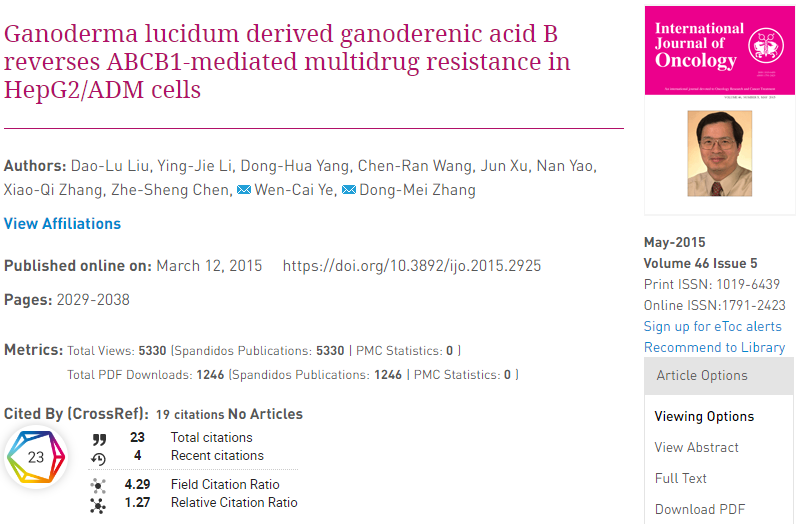
Il y a l'Université 2015 / Jinin, etc./ International Journal of Oncology
Compilation / Wu Tingyao
The resistance of cancer cells to multiple chemotherapeutic drugs makes cancer treatment difficult. L'une des principales raisons pour lesquelles les cellules cancéreuses développent une résistance multi-médicaments est que la protéine ABCB1 (Membre sous-famille de cassette de liaison à l'ATP 1) on the cell surface will expel drugs out of the cell, causing insufficient drug concentration in cells to kill cancer cells.
According to research published by Jinan University and others, a single triterpenoid “ganoderenic acid B” isolated fromGanoderma lucidum can regulate the gene of drug resistance protein ABCB1, reduce its expression level, and at the same time inhibit the activity of ABCB1 ATPase, preventing ABCB1 from performing its function of “expelling chemotherapeutics out of the cell.”
By cultivating ganoderenic acid B and the drug-resistant liver cancer cell line HepG2/ADM together, the chemotherapeutic drug (rhodamine-123) that was originally blocked can enter the cancer cells and accumulate a considerable amount there. Ganoderenic acid B can indeed help increase the toxic effect of doxorubicin, vincristine and paclitaxel against the drug-resistant HepG2/ADM and even improve the therapeutic effect of doxorubicin against drug-resistant breast cancer cell line MCF-7/ADR.
Dans le passé, studies in Taiwan have confirmed through cell and animal experiments that the ethanol extract of Ganoderma tsugae (triterpenoid total extract) can improve the therapeutic effect of chemotherapeutic drugs against drug-resistant lung cancer cells (Evid. Based compiement alternat Med. 2012; 2012:371286 ). Now the experiment of Jinan University clearly pointed out that the ganoderenic acid B in the triterpenoids is the active ingredient to reverse drug resistance of cancer cells. The connection of these different experiments has made the function of Ganoderma lucidum triterpenoids in reversing the drug resistance of cancer cells increasingly obvious.
The development of inhibitors against drug-resistant proteins such as ABCB1 is currently the goal of the active efforts of the medical community, but it seems that there is no ideal drug yet (Taiwan Medical Community, 2014, 57: 15-20). Preliminary research results have pointed out the potential of ganoderenic acid B in this area, and we look forward to further animal experiments to provide stronger evidence in the future.
[Source] Liu DL, et autres. Ganoderma lucidu derived ganoderenic acid B reverses ABCB1-mediated multidrug resistance in HepG2/ADM cells. Int J Oncol. 46(5):2029-38. est-ce que je: 10.3892/ijo.2015.2925.
FIN
À propos de l'auteur/Mme. Wu Tingyao
Wu Tingyao a fait un reportage de première main Lingzhje informations depuis 1999. Elle est l'auteur de Guérir avec Ganoderma (publié dans The People's Medical Publishing House en avril 2017).
★ Cet article est publié sous l'autorisation exclusive de l'auteur
★ Les œuvres ci-dessus ne peuvent pas être reproduites, extrait ou utilisé d’une autre manière sans l’autorisation de l’auteur
★ Violation de la déclaration ci-dessus, l'auteur poursuivra ses responsabilités légales y afférentes
★ Le texte original de cet article a été rédigé en chinois par Wu Tingyao et traduit en anglais par Alfred Liu.. S'il y a une divergence entre la traduction (Anglais) et l'original (Chinois), le chinois original prévaudra. Si les lecteurs ont des questions, veuillez contacter l'auteur original, MS. Wu Tingyao.



